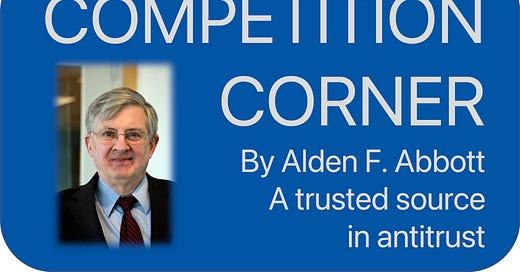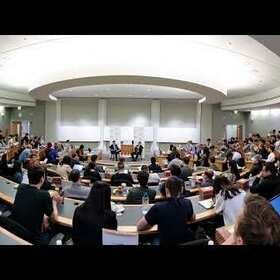Competition Corner by Alden Abbott - Do Not Go Gentle Into That Good Night
Issue #5
Originally Posted May 6, 2022
Invoking Dylan Thomas’s most famous work may come across to some as melodramatic, but its symbolic significance cannot be overstated in today’s competition policy landscape. Gone are the days of consensus around a common standard of consumer welfare and, like last month, I continue to push back against the notion that competition is declining and the economy is not working for consumers. Antitrust need not go gentle into the good night of interventionist reform, and I rage against the dying of antitrust’s consumer centric light.
Our headline discussion this month comes in the form of a podcast with Douglas Melamed and Joshua Wright, assessing recent developments in antitrust and musing about where we are headed. Next, I highlight a recent panel discussion at the 2022 Antitrust and Competition Conference, put on by the Stigler Center, where I discuss the future of the consumer welfare standard.
At Truth on the Market, I highlight new research by Yueran Ma that pushes back against the notion that corporate concentration has harmed consumers and destroyed competition. Next, Andrew Mercado and I, in a pair of commentaries, counter the idea that data-collection practices by large tech platforms cause harm to consumers. In fact, as we discuss, consumers are better off when platforms curate offerings based on consumer data. Finally, I provide links to recent provocative articles on FTC rulemaking and labor-antitrust policy.
Antitrust Policy and its Different Perspectives | Mercatus Center
Douglas Melamed, of Stanford University, and Joshua Wright, of George Mason University, often disagree on aspects of antitrust. However, they both agree that some of the Biden Administration’s current policy initiatives go too far. In a recently released podcast, I sit down with these gentlemen to discuss all things antitrust, from Biden’s executive order and eliminating the FTC’s competition authority, to patents, innovation, and Qualcomm. My discussion with these scholars sheds light on how some of the most influential thinkers in competition policy today are digesting recent developments.
What is the Future of the Consumer Welfare Standard? | 2022 Antitrust and Competition Conference
It is difficult to find a more central concept to US antitrust enforcement than the Consumer Welfare Standard (CWS). For its defenders, the Standard centers antitrust policy on a clear, coherent goal—preventing it from being ‘hijacked’ by competitors. For others, the Standard is itself the tool that enabled the ‘hijacking’ of antitrust policy away from its goals of protecting both the competitive process and economic liberty. On a recent panel moderated by Luigi Zingales at the 2022 Stigler Center Antitrust and Competition Conference, Doha Mekki, Fiona Scott Morton, Zephyr Teachout, and I discuss the CWS and lay out our plans for antitrust if we become “king or queen” for the day.
Concentration Study Further Undermines Narrative that US Competition Has Sharply Declined | Truth on the Market
A new scholarly study of economic concentration sheds further light on the flawed nature of the Neo-Brandeisian claim that the United States has a serious “competition problem” due to decades of increasing concentration and ineffective antitrust enforcement. In a hot off the press commentary for Truth on the Market, I highlight Yueran Ma’s new research and again call for a pause of interventionist enforcement based on the flawed premise that competition has weakened in the past 50 years. For more on my push against the “decreasing competition” story, see here and here.
Lina Khan’s Privacy Proposals Are at Odds with Market Principles and Consumer Welfare | Truth on the Market
The Federal Trade Commission (FTC) is at it again, threatening new sorts of regulatory interventions in the legitimate welfare-enhancing activities of businesses—this time in the realm of data collection by firms. In this recent commentary for Truth on the Market, I discuss why the FTC’s approach is misguided and at odds with the core tenants of consumer welfare. The FTC should focus on abuses that come from deceptive and fraudulent activity, not mere data-collection that has been shown to impart large consumer surpluses.
The Paradox of Choice Meets the Information Age | Truth on the Market
In his seminal work “The Paradox of Choice,” Barry Schwartz argues that, faced with an ever-increasing plethora of products to choose from, consumers often feel overwhelmed and seek to limit the number of choices they must make. In today’s online digital economy, a possible response to this problem is for digital platforms to use consumer data to present consumers with a “manageable” array of choices and thereby simplify their product selection. In a recent commentary for Truth on the Market, Andrew Mercado surveys a new research paper and discusses the consumer welfare implications of various data-collection and analysis regimes. Spoiler: consumers are generally better off when platforms use data to suggest product choices.
Upcoming Events
Concurrences FTC Rulemaking Authority Conference: June 27, 2022
The time has finally come for the much anticipated Concurrences conference on FTC rulemaking authority. I will be speaking on the second panel of the day, focusing on the role of Congress and the role of the FTC in the rulemaking process and the questions and issues that arise from conflicts of law and jurisdiction. Stay tuned for the conference link and the forthcoming book release.
What’s Alden Reading?
Truth on the Market Symposium: FTC Rulemaking on Unfair Methods of Competition
Since April 25th, the fine individuals at Truth on the Market have been curating a number of articles on Unfair Methods of Competition rulemaking at the FTC. From established law professors to up and coming young scholars, the articles included in the symposium thus far have been exemplary. It is well worth everyone’s time to work their way through the list.
Monopolies Are Not Taking a Fifth of Your Wages | ITIF
ITIF Associated Director (and former FTC economist Julie Carlson) explains that “[a] recent Treasury report on labor market competition provided a misleading narrative about labor market concentration and its effect on workers. Labor market power is largely due to labor market frictions, not concentration. Firms are not profiting at the expense of workers.” This provocative article has important implications for sensible labor-antitrust policy.












